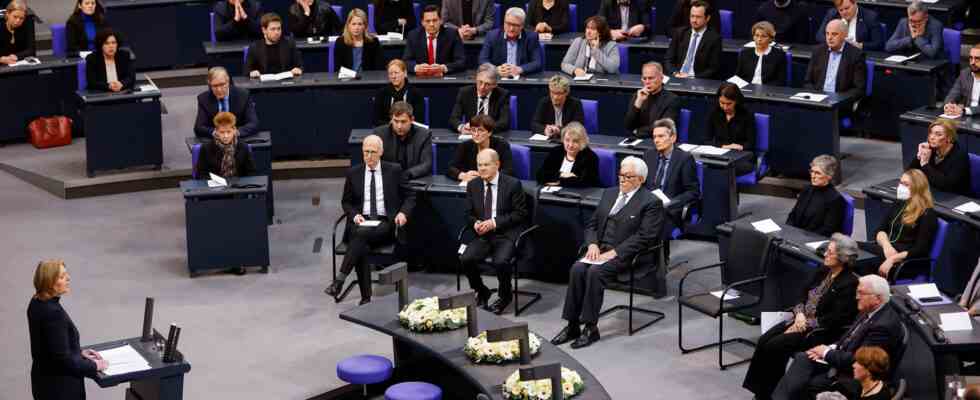Status: 01/27/2023 11:59 am
With an hour of remembrance, the Bundestag for the first time specifically commemorated the persecution of queer people during the Nazi era. Many died as a result of forced labor and inhumane conditions in the concentration camps.
On the occasion of the International Holocaust Remembrance Day, the Bundestag commemorated the victims of National Socialism in the morning. For the first time, the focus was on people who were persecuted by the National Socialists because of their sexual orientation or identity.
Bundestag President Bärbel Bas said there should be no end to the memory of all victims who were persecuted, threatened, disenfranchised and murdered by the National Socialists. If the contemporary witnesses gradually die, others would have to tell their story. “The victims of the Holocaust will not be forgotten.”
On January 27, 1945, Red Army soldiers liberated the survivors of the German concentration and extermination camp at Auschwitz in occupied Poland. The Nazis had murdered more than a million people there. Since 1996, the date has been celebrated in Germany as Holocaust Remembrance Day.
Memorial hour in the Bundestag for the victims of National Socialism puts the persecution of sexual minorities in the foreground for the first time
Tina von Löhneysen, ARD Berlin, daily news at 12:00 p.m., January 27, 2023
Up to 50,000 men imprisoned during the Nazi era
Bas said it was also very important to her “that today we commemorate the people who have been persecuted because of their sexual orientation and gender identity”. Because the end of National Socialism was not the end of state persecution for this group of victims. Even after the end of the Nazi dictatorship, gay men in particular were threatened by Article 175 of the Criminal Code.
The so-called “gay paragraph” was introduced in the German Empire and criminalized sexual acts between men. The law was tightened in 1935 under the Nazi regime. According to the federal anti-discrimination agency, up to 50,000 men were imprisoned under paragraph 175 during the Nazi dictatorship, and around 15,000 were sent to concentration camps. Many of them died as a result of forced labor and the inhumane conditions in the camps.
Even after the Second World War, the paragraph remained part of the German penal code. According to a report commissioned by the Anti-Discrimination Agency, around 50,000 men were convicted on this basis by 1969. From today’s perspective, it sounds “incredible” that paragraph 175 was finally abolished in reunified Germany in 1994, said Bas.
Bas: “Queer-hostile crimes are on the rise”
Also with a view to today, Bas warned to take a closer look at discrimination against queer people. “Queer-hostile crimes are increasing,” said the SPD politician. “Gay, lesbian and trans people are insulted, harassed and attacked.”
With regard to the Holocaust, Bas warned that it is dangerous to think that the Germans have learned the lesson. “We must continue to confront our past.” A free, open society cannot be taken for granted.
“I am also concerned about attempts to relativize the uniqueness of the Holocaust,” said the President of the Bundestag. “Anti-Semitism and antiziganism, racism are on the rise again. “On average, five anti-Semitic crimes are registered in Germany every day. Memorials are desecrated. Jewish institutions and synagogues are attacked, people are hostile, threatened and attacked because they are Jews. It’s a shame for our country.”
According to Bas, anti-Semitism is increasingly taking on hidden forms, such as conspiracy theories or the demonization of the State of Israel. “We have to be vigilant and look closely.” Also when it comes to discrimination against queer people, Bas added. “‘Never again’ is a task for all of us. Where hatred is rampant, no one is safe.”
Kats: “The promise ‘never again’ didn’t mean all victims by a long shot”
Holocaust survivor Rozette Kats also spoke at the memorial service. She was born in 1942 and survived the Shoah with a married couple in Amsterdam. Her parents and her little brother were murdered in Auschwitz. In her speech she warned that all victims of the Nazis should be equally remembered. “Everyone who was persecuted back then deserves respectful remembrance,” said the 80-year-old.
Kats highlighted similarities between her own fate and the persecuted queer people. What they had to learn as a child—to hide and deny their identity—so did many members of sexual and gender minorities. Even after 1945. Something like that “makes people sick.”
“The promise ‘Never again’ by no means meant all victims of the National Socialists,” said Kats. “Roma and Sinti had to fight for recognition for decades. And again it was only very late that it was understood that the reason for imprisonment was ‘asocial’, a Nazi definition that was also misused to condemn lesbian women.” This allowed the ideology of the Nazis to continue to have an effect and still does, “if we still have to experience acts of violence against queer people”.
“Hour of remembrance important for the whole queer community”
One survivor of the persecution of sexual minorities during the Nazi era did not get a chance to speak. Those affected have since died. Representing them, the actress Maren Kroymann and her colleague Jannik Schümann presented life stories of homosexual men and women.
Queer activist Klaus Schirdewahn from Mannheim also gave a speech. He was arrested in West Germany in 1964 under paragraph 175. Today he is doing all he can to ensure “that our history is not forgotten. Especially today, when the queer community is again being subjected to great hostilities around the world.” It is important to him that young people don’t forget how much effort and strength it took “that we can live the way we are allowed to live,” says Schirdewahn.
It took too long for the dignity of homosexuals to count in Germany. “That’s why today’s commemoration is not only important for me, but for the whole community”. It is a sign of recognition and a sign in society. Give those affected back some of their dignity.

